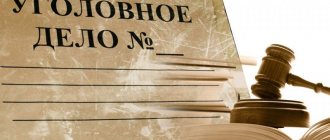Powers of the prosecutor as a participant in judicial proceedings
Note 1
A prosecutor is an official authorized to carry out, on behalf of the state, within the limits of his competence, criminal prosecution in the process of criminal proceedings, as well as supervision over the procedural activities of preliminary investigation bodies and inquiry bodies (Article 37 of the Code of Criminal Procedure).
During pre-trial proceedings, the prosecutor is authorized to:
- monitor compliance with the requirements of federal legislation when registering, receiving and considering reports of offenses;
- Based on the facts of violations of the criminal law identified by the prosecutor, make a decision on sending materials to the inquiry body or investigative body to resolve the issue of criminal prosecution;
- give written instructions to the investigator on the conduct of procedural actions, the direction of the investigation, consent to initiate a petition for the production of a procedural action before the court, allowed on the basis of the relevant court decision;
- demand from investigative and inquiry bodies the elimination of violations of federal laws committed during the preliminary investigation or inquiry;
- cancel unfounded or illegal decisions of the investigator and lower-ranking prosecutor;
- allow challenges and self-recusations submitted to the investigator;
- remove from further investigation the investigator who committed the violation;
- withdraw any criminal case from the investigating agency and transfer it to the investigator with justification for such transfer;
- transfer cases from one preliminary investigation body to another, withdraw the case from the federal executive body, transfer it to the Investigative Committee under the Prosecutor's Office of the Russian Federation with justification for this transfer;
- approve a decision to terminate proceedings, approve an indictment or indictment in a criminal case;
- return the criminal case to the investigator, interrogating officer with accompanying written instructions on changing the qualifications of the actions of the accused, on conducting an additional investigation, changing the scope of the charge, indictment or indictment, and eliminating all identified deficiencies.
Are you an expert in this subject area? We invite you to become the author of the Directory Working Conditions
During the trial, the prosecutor supports the state prosecution and enjoys the same rights as other participants in the trial (Article 15). The public prosecutor actively participates in the study of evidence, provides the court with his own opinion on the essence of the charge and other issues that arise during the trial, on the application of penalties and criminal legislation in relation to the defendant. The prosecutor has the right, on the grounds and in the manner prescribed by law, to refuse criminal prosecution during pre-trial proceedings, and in court to terminate the case.
On the figure and status of the prosecutor in criminal proceedings
In contrast to professional representatives of the defense, who detail what they say out of habit, on the prosecution side there has not been a clear division between the concepts of prosecutor as a position (official) and prosecutor as a participant in criminal proceedings (prosecutor as public prosecutor). The established “lawyer-defender” connection is not analogous to the “prosecutor-state prosecutor” connection. A lawyer becomes a defense attorney after presenting a certificate and a warrant to the relevant official (Part 4 of Article 49 of the Code of Criminal Procedure of the Russian Federation). From this moment on, he becomes a participant in the criminal process, having a single status at any stage of the criminal process up to the proceedings in the supervisory court (Part 1 of Article 402 of the Code of Criminal Procedure of the Russian Federation also indicates a defense lawyer). The rights and obligations of a defense attorney are set out in sufficient detail both in the status articles of the Code of Criminal Procedure of the Russian Federation (Articles 49, 53) and in special norms. Here, as a rule, there are no ambiguities; everything is clearly detailed. With prosecutors the situation is more complicated. Article 31 5 of the Code of Criminal Procedure of the Russian Federation defines the prosecutor as follows: “The Prosecutor General of the Russian Federation and the prosecutors subordinate to him, their deputies and OTHER OFFICIALS of the prosecutor’s office, PARTICIPATING in criminal proceedings and ALLOWED WITH THE CORRESPONDING POWERS BY THE FEDERAL LAW ON THE PROSECUTOR’S OFFICE” (hereinafter, it is emphasized by me. - R.Ch. ).
It is interesting that the Code of Criminal Procedure of the Russian Federation is not mentioned in this definition as a regulator of the rights and duties of prosecutors (their official powers) - the leading role is given to the Law on the Prosecutor's Office. Taking into account the fact that, as a general rule, official powers cannot be interpreted in the direction of expansion, it turns out that the PROSECUTOR PARTICIPATING in criminal proceedings is vested only with those powers that are granted to him by the Federal Law “On the Prosecutor’s Office”, which contradicts Part 2 of Art. 1 and art. 7 Code of Criminal Procedure of the Russian Federation. In addition, the wording “and other officials of the prosecutor’s office” allows us to include in the concept of “prosecutor” and investigator of the prosecutor’s office.
Further. Trying to detail the status of participants in criminal proceedings, the procedural law specifies: “The prosecutor is an official authorized, within the competence ESTABLISHED BY THIS CODE, to carry out criminal prosecution on behalf of the state during criminal proceedings, as well as SUPERVISION over the procedural activities of the inquiry bodies and preliminary investigation bodies.” (Part 1 of Article 37 of the Code of Criminal Procedure of the Russian Federation). As we can see, here one of the elements of the prosecutor’s status is the presence of competence established by the Code of Criminal Procedure of the Russian Federation.
One could say that the definition of paragraph 31 of Art. 5 of the Code of Criminal Procedure of the Russian Federation is a mistake, a technical defect of the legislator, if not for the second half of Part 1 of Art. 37 of the Code of Criminal Procedure of the Russian Federation, which again points to the concept used in the Federal Law “On the Prosecutor’s Office of the Russian Federation”, namely SUPERVISION. It should be noted that nowhere else in the text of the Code of Criminal Procedure of the Russian Federation is there any mention of prosecutorial supervision (there are only references to supervisory submissions in the supervisory court, but these are paronyms).
At the same time, part 2, paragraph 17, art. 37 of the Code of Criminal Procedure of the Russian Federation provides for the prosecutor the opportunity to “exercise other powers provided for by this Code,” i.e. again “closes” its competence to the Code of Criminal Procedure of the Russian Federation. Thus, in a comparative analysis of the above provisions of paragraph 31 of Art. 5 and art. 37 of the Code of Criminal Procedure of the Russian Federation reveals significant contradictions in the definition of the prosecutor as a participant in criminal proceedings. On the one hand, a prosecutor is understood as an official of the prosecutor’s office (and an investigator of the prosecutor’s office as well); on the other hand, the law directly indicates the mandatory nature of its provisions and adherence exclusively to the norms of the Code of Criminal Procedure of the Russian Federation, while at the same time establishing the possibility of the prosecutor using powers not provided for by the Code . At the same time, the Code of Criminal Procedure of the Russian Federation indicates that the powers of the prosecutor are exercised by district and city prosecutors, their deputies, equivalent prosecutors and superior prosecutors (Part 6 of Article 37), i.e. specifically names a list of positions to which the powers provided for by it can be applied. Following the logic, we note that all other powers (under the Federal Law on the Prosecutor's Office) correspond to other positions.
One contradicts the other, contradicting itself.
At first glance, one gets the impression that the concept of “prosecutor” in the Code of Criminal Procedure of the Russian Federation has nothing to do with the procedural status of a participant in criminal proceedings. Under the mask of the prosecutor hides “the entire royal army,” namely, all officials of the prosecutor’s office, endowed with dual competence (on the one hand, the powers provided for by the Law on the Prosecutor’s Office, on the other, the powers granted by the Code of Criminal Procedure of the Russian Federation). This is also evidenced by the fact that the procedural law names the “prosecutor’s office” as a participant in the process (Part 2 of Article 1 of the Code of Criminal Procedure of the Russian Federation).
However, an analysis of the concept of public prosecutor leads to the conviction that errors in the terminology of the Code of Criminal Procedure of the Russian Federation were made deliberately. Let us turn to the legislative definition: “a public prosecutor is an official of the prosecutor’s office supporting on behalf of the state in a criminal case, and on behalf of the prosecutor and in cases where the preliminary investigation is carried out in the form of an inquiry, also an interrogator or investigator” (clause 6 of Art. 5 Code of Criminal Procedure of the Russian Federation).
As we can see, the legislator generally separated the concepts of “official of the prosecutor’s office” and “prosecutor”, potentially including both the investigator and the interrogating officer in the circle of public prosecutors. At the same time, part 4 of Art. 37 of the Code of Criminal Procedure of the Russian Federation refers exclusively to the prosecutor as a person supporting the state prosecution, indicating the possibility of entrusting this function to the same interrogating officer and investigator. In other words, based on the text of the law, it is impossible to determine who the prosecutor is as a participant in the criminal process. More precisely, the Code of Criminal Procedure of the Russian Federation does not formulate the concept of “prosecutor as a participant in criminal proceedings”, since it does not distinguish between it and the position of prosecutor provided for by the Federal Law “On the Prosecutor's Office of the Russian Federation”.
Thus, the Code of Criminal Procedure of the Russian Federation provides access to participation in the process on the prosecution side to officials of the prosecutor's office, inquiry and investigation with the rights and competence provided for both by the Code of Criminal Procedure of the Russian Federation and the Law on the Prosecutor's Office. At first glance, such a conclusion may seem to be the fruit of idle theorizing. This is wrong. The concept of “party in criminal proceedings” is closely related to the concept of “participant in criminal proceedings”. It is in the practical aspects of procedural law that these issues are transformed from technical and legal ones into social ones, since the parties are equal before the court (Part 4 of Article 15 of the Code of Criminal Procedure of the Russian Federation), but, as we see, are initially not equal before the law. The Constitution of the Russian Federation guarantees the equality of everyone before the law and the courts.
By this we should understand the equality of all for whom it constitutes the actual existence “here and now.” The law is equally binding on both the citizen and the state, no matter who represents it. The body ensuring this equality is the court, which is subject exclusively to the law. These are the basics of democracy, successfully disavowed in the Code of Criminal Procedure of the Russian Federation. The lack of a clear understanding of the participant in criminal proceedings on the part of the prosecution (namely, this is what Chapter 6 of the Code of Criminal Procedure of the Russian Federation is called) makes the implementation of the requirements of the Code of Criminal Procedure of the Russian Federation strictly dependent on the structural organization of the prosecutor's office. In other words, the prosecutor's office receives the right to expand its competence in criminal proceedings without resorting to changing the text of the Code of Criminal Procedure of the Russian Federation.
Thank God this is not yet practiced. But the mere fact that any official of the prosecutor’s office is a potential participant in criminal proceedings with the right to be called a prosecutor and public prosecutor is already a sufficient basis for stating the lack of opportunity to realize the equality of the parties in criminal proceedings.
The function of public prosecution cannot and should not belong to anyone ex officio. Throughout human history, public prosecution has acted as a function that finds itself within the framework of justice and does not go beyond the boundaries of justice. The essence of justice is that any issues are resolved exclusively within the framework of justice itself, “here and now,” in a special, predetermined form. But to deal with the administration of justice despite the fact that such an important element as the prosecution is completely reduced to the structural organization of the state a body with unclear legal competence and legal status is impossible.
The prosecutor does not perform any functions in criminal proceedings; according to the Code of Criminal Procedure of the Russian Federation, he has the right to structure them. On the prosecution side we have not the state and the victim, but a prosecutor who protects the interests of the victim and hides behind the representative function assigned to him by the state. Returning to the understanding of a party in criminal proceedings, it should be noted that the Code of Criminal Procedure of the Russian Federation connects the concept of a party not only with the judicial proceedings in the case , which is very strange.
So, ch. 6 of the Code of Criminal Procedure of the Russian Federation indicates the following participants in criminal proceedings on the part of the prosecution: prosecutor, investigator, head of the investigative department, body of inquiry, interrogating officer, victim, private prosecutor, civil plaintiff, representatives (victim, civil plaintiff and private prosecutor). With the last four, everything is clear - here the principle of procedural metamorphosis is observed, similar to the metamorphosis “lawyer - defender”. The previous “participants” (with the exception of the body of inquiry), as we have seen, can be attributed to the concept of “state prosecutor” and, probably, that’s why they are linked by the legislator to the concept of party.
Based on their functions, they cannot in any way act as a party when it comes to pre-trial proceedings in the case. The reference to the fact that the Code of Criminal Procedure of the Russian Federation provides for forms of judicial control and authorization and that is why these participants are included in the concept of a party is untenable, since there are such forms of activity of these participants as operational search activities and preliminary investigations against unidentified persons, where the other party (i.e. suspect, accused) is missing. In addition, the analysis of Art. 125 of the Code of Criminal Procedure of the Russian Federation makes us think about who the legislator generally meant by the prosecutor in relation to this form of pre-trial proceedings in the case.
And what exactly functions in this case should the prosecutor carry out - whether it is carrying out criminal prosecution and maintaining charges (possibly charges brought as part of the investigation) or supervision (Part 1 of Article 37 of the Code of Criminal Procedure of the Russian Federation). It is clear that within the framework of Art. 125 of the Code of Criminal Procedure of the Russian Federation, a prosecutor cannot be a state prosecutor. But also supervision within the framework of Art. 125 of the Code of Criminal Procedure of the Russian Federation cannot be implemented in the sense as the Law on the Prosecutor’s Office understands it. Moreover, if Part 4 of Art. 37 of the Code of Criminal Procedure of the Russian Federation obliges the prosecutor, within the framework of judicial proceedings in the case when supporting the state prosecution, to ensure the legality and validity of the latter, then within the framework of Art. 125 of the Code of Criminal Procedure of the Russian Federation does not specify any obligations.
Accordingly, procedural equality of the parties is initially impossible: the law generally lacks a clear understanding of who the parties are, which, however, is indirectly confirmed by the wording of Art. 244 of the Code of Criminal Procedure of the Russian Federation, indicating which actions the parties have equal rights to. Thus, we have to conclude that the concept of a prosecutor as a participant in criminal proceedings has not been formed in the Code of Criminal Procedure of the Russian Federation.
This has led to the fact that the function of the prosecution is assigned not to a specific participant in the criminal process, who embodies the prosecution side within the framework of justice, but to the entire apparatus of law enforcement agencies as a whole, taking into account the fact that the prosecutor’s office, in accordance with the Law on the Prosecutor’s Office, is given the leading role in organization of work of law enforcement agencies. The same is evidenced by the specific powers of the prosecutor, named directly in the Code of Criminal Procedure of the Russian Federation. Under such circumstances, it is unacceptable to say that in our country a transition has been made from repressive punitive criminal procedure legislation to democratic legislation, ensuring the implementation of the basic principles of legal proceedings of international standards.
The role of the prosecutor in the criminal process, coupled with the program settings of the Prosecutor General's Office of the Russian Federation - namely, they, and not the Code of Criminal Procedure of the Russian Federation, ensure the activities of the prosecutor, based on the text of the Code of Criminal Procedure of the Russian Federation (clause 31 of Article 5) - neutralize the role of the court as a body ensuring equality of rights of the parties , besides, the Code of Criminal Procedure of the Russian Federation itself establishes only the equality of the parties before the court, and not the equality of procedural rights (Part 4 of Article 15). Rules such as rehabilitation, refusal of criminal prosecution, assignment of criminal prosecution (for example, formulated in Part. 2, Article 6 of the Code of Criminal Procedure of the Russian Federation), are essentially a fiction, since legal hypotheses for their implementation are not provided for in those legislative acts that regulate the activities of the prosecutor's office. From the practical side, the situation is even more monstrous.
The prosecutor has his own COMPETENCE, has in his hands the levers of pressure on any subject of the preliminary investigation, de facto independently makes decisions on any issue of the preliminary investigation and has power that combines a range of powers, the implementation of which is not controlled, balanced and not restrained by anyone except for the superior prosecutor. Taking into account the fact that each prosecutor is entrusted with the responsibility for carrying out criminal prosecution, the system of prosecutorial bodies forms a single subject of criminal prosecution, acting in criminal proceedings under the collective concept of “prosecutor”.
The court turns out to be a figure of cover and legalization of the implementation of the prosecutor's powers to actually administer justice. At the same time, a court of any composition, when considering cases at first instance, is deprived of the opportunity to confront the “prosecutor”, since behind the latter there is an organization hiding, while the court is always just a specific judge. In other words, today the confrontation in court (especially in the case when the court takes the side of the defense) de facto occurs between a personal and a socially organized participant in the criminal process (the prosecutor's office).
As a first approximation to resolving this issue, it should be noted that a clear legislative (within the framework of the Code of Criminal Procedure of the Russian Federation) definition of the status of a participant in the process on the part of the prosecution is necessary, by analogy with the defense. Finally, it is necessary to remove the state prosecution from the area of competence of the state body and transfer it to an official, whose duties will be determined by the legally established (within the framework of the Code of Criminal Procedure of the Russian Federation) status of the participant in the process on the part of the prosecution.
We believe that by separating the concepts of “public prosecutor” and “prosecutor”, the legislator will take a big and important step towards structuring the rule of law in Russia. In our opinion, a public prosecutor who is not related to the prosecutor’s office and is not supervised by it as a participant in criminal proceedings , is that element of the justice organization system that today can radically change the situation in favor of objective, unbiased, fair proceedings in Russia.
The article was published in the monthly information and analytical magazine on the practical application of legislation “Advocate” No. 12 December 2005. The article had increased relevance for the period of 2005 (before the creation of the investigative committee at the prosecutor's office), it is presented here without cuts due to the fictitiousness of the reform of the Russian prosecutor's office in 2007.
The main tasks of the prosecutor’s participation in criminal proceedings
The basis of criminal proceedings is the principle of adversarialism and equality of the parties (Article 123 of the Constitution), which provides that only one participant in legal proceedings should perform one criminal procedural function. The prosecutor, according to the Code of Criminal Procedure, belongs to the prosecution, implementing the functions of criminal prosecution.
Finished works on a similar topic
Course work Prosecutor as a participant in judicial proceedings in criminal cases 410 ₽ Abstract Prosecutor as a participant in judicial proceedings in criminal cases 250 ₽ Test work Prosecutor as a participant in judicial proceedings in criminal cases 190 ₽
Receive completed work or specialist advice on your educational project Find out the cost
At different stages of criminal proceedings, criminal prosecution has its own forms of expression. Criminal prosecution at the pre-trial stages is carried out in the form of a preliminary investigation, and in the judicial stages - in the form of maintaining state prosecution.
The Code of Criminal Procedure establishes the primary role of the prosecutor in criminal prosecution. The procedural skill and activity of the prosecutor in presenting and examining evidence play a priority in ensuring the inevitability of punishment for a crime.
Prosecutors taking part in the consideration of criminal cases solve the following tasks:
- improve the work of maintaining the state prosecution as an effective means of fighting crime; the primary duty of prosecutors is to participate in the proceedings of criminal cases;
- participate in the trial of criminal cases of private-public and public prosecution initiated by a magistrate;
- regularly and personally support the public prosecution;
- to contribute in every possible way to the court’s establishment of the truth, which is important for making a fair, informed and legal decision;
- ensure the participation of public prosecutors in hearings of courts of appeal in criminal cases (only the prosecutor has the right to cassation and appeal of court decisions), etc.
One of the main tasks is to improve the professionalism of public prosecutors who do not have much experience in criminal proceedings. To achieve this, it is important to create a system of professional training and retraining, improve the entire educational and methodological process, and involve legal scholars and experienced practitioners in the educational process; disseminate and study the positive experience of their work, etc.
The prosecutor as the main arbiter in the pre-trial stage
The position of the prosecutor's office has recently become the object of close attention from representatives of the legal community, who have repeatedly pointed out the problem of the insufficiency of the prosecutor's powers to exercise effective supervision over the rule of law.
Thus, in No. 12 of Novaya Advokatskaya Gazeta, lawyer of the Moscow Region AP, managing partner of AVEX YUST Law Firm Igor Bushmanov published an article “The main arbitrator in the pre-trial stage”, in which he shared his thoughts on the need to strengthen the role of the prosecutor’s office in the pre-trial stage of criminal proceedings affairs.
According to Igor Bushmanov, “The Law on the Prosecutor’s Office is hopelessly outdated, and the current Code of Criminal Procedure of the Russian Federation does not open up effective supervisory opportunities for the prosecutor’s office.” At the same time, it is about, since the prosecutor’s office plays an important role in maintaining the “balance of checks and balances” in the functioning of the judicial machinery. “The absence of a mechanism to ensure this particular balance leads to instability of the judicial and law enforcement system and stimulates the further development of irreversible degradation processes in it,” he is sure.
On the website of the Novaya Advocates Gazeta there was also a discussion among lawyers about possible measures to strengthen the role of the prosecutor’s office at the pre-trial stage.
The time has come to evaluate the reforms: have they been beneficial? Igor Bushmanov in his article recalls that the rights of the prosecutor at the pre-trial stage in the Russian Empire, and then in the USSR, and in the first 15 years of the Russian period were quite broad. However, in 2007, Federal Law No. 87-FZ carried out a reform of the criminal procedural regulation of the pre-trial stage, and the powers of the prosecutor to supervise the preliminary investigation were significantly narrowed; in 2011, the Investigative Committee was removed from the prosecutor's office.
According to the lawyer, time has shown the short-sightedness and fallacy of such legislative decisions. He believes that since the separation of the investigation from the prosecutor’s office, the latter’s supervisory rights at the preliminary investigation stage have actually turned into a fiction, and the independence of investigators often leads to ignoring the requirements of the law and violating the rights of clients and clients.
Developing Igor Bushmanov’s idea about the post-reform interaction between the prosecutor’s office and the Investigative Committee, lawyer of the Admiralty Bar Association of St. Petersburg Konstantin Kuzminykh Fr.
Partner at Kovalev, Ryazantsev and Partners Law Firm Mikhail Kiriyenko noted that the popularity of proposals to return part of the powers to prosecutors and strengthen their role at the pre-trial stage is associated with the following reasons: high-profile cases where representatives of investigative bodies are involved, low quality of departmental control, frank confrontation between departments, the dominance of illegally initiated criminal cases, violation of the reasonableness of the terms of the preliminary investigation.
AG experts are unanimous in their opinion that the prosecutor’s office should exercise broader powers by returning “former rights” and granting some new ones.
The prosecutor has the right to give mandatory instructions to the investigator. The head of the investigative body now has powers in the sphere of supervision of the preliminary investigation. However, experts believe that the power to give instructions on the direction of the investigation should be returned to the competence of the prosecutor.
Thus, Igor Bushmanov proposes to authorize prosecutors to give the investigator the following mandatory written instructions: on the direction of the investigation, the classification of crimes, the performance of certain procedural actions that are mandatory for execution by the investigator and his supervisor; cancel any illegal or unfounded decisions of the investigator; allow challenges filed to the investigator, remove him from further investigation if he committed a gross violation of the requirements of the Code of Criminal Procedure of the Russian Federation; suspend or terminate proceedings in any criminal case.
“Thanks to these effective supervisory functions, it will be possible to combat protracted and poor-quality investigations, timely correction of investigative errors and their further prevention. At the same time, the rights of the investigator himself as an independent and independent participant in criminal proceedings will not be limited,” the lawyer explained.
Mikhail Kiriyenko is confident that since the prosecutor ensures the rule of law, any of his decisions aimed at restoring the violated rights of participants in criminal proceedings should not only be binding on the investigator, but also be subject to independent execution. In the remaining part, the investigator must be able to act in accordance with his own opinion.
“This power can be enshrined in Art. 37 of the Code of Criminal Procedure of the Russian Federation as an opportunity, at the request of a participant in criminal proceedings, to make decisions binding on the investigator to ensure the rights of such a participant in the actual existence of his criminal prosecution,” he believes. In addition, in Part 6 of Art. 37 of the Code of Criminal Procedure of the Russian Federation must indicate that the above procedure does not apply to demands for the restoration of the rights of participants in criminal proceedings, which are subject to mandatory execution.
This option, according to the lawyer, will, firstly, make it possible to respond to violations within the framework of current control, and secondly, it will narrow the boundaries of determining the progress of the investigation by prosecutors and interfering with the independence of investigative bodies.
Return to the prosecutor the right to initiate a criminal case. Experts recognize the right to initiate criminal cases and cancel illegal decisions of investigators as one of the important lost functions of the prosecutor.
According to Igor Bushmanov, it is necessary to return to the prosecutor the right to initiate and investigate a criminal case, at least in relation to the so-called special subjects and when illegal refusal decisions of the investigator and interrogator are cancelled. “In the absence of such a right, the prosecutor’s performance of the function of criminal prosecution in the pre-trial stages is significantly complicated,” he is sure.
Mikhail Kiriyenko agreed that it is necessary to secure the rights of the prosecutor to initiate criminal cases of certain categories against a specific person and transfer them to the investigative body in compliance with the requirements of investigative jurisdiction. In his opinion, the existing legislative regulation of the stage of initiating a criminal case and subsequent stages of supervision actually creates unjustified stages.
He also considers it appropriate to extend this right to cases of illegal prosecution. “But giving them such a right in relation to all categories of cases is also unjustified, since their capabilities in identifying facts and conducting checks are limited, in contrast to the pre-investigation stage, where there are more tools for collecting evidence,” the lawyer noted.
He also emphasized that it should be a mandatory requirement that the prosecutor has the right to make an appropriate decision only if there is sufficient data indicating that a specific person has committed a crime for which the statute of limitations for criminal prosecution has not expired. “In other categories of cases, the current order seems more preferable,” he believes.
“A reasonable expansion of powers in pre-trial criminal proceedings will significantly strengthen the rule of law in this area, increase the efficiency and quality of work of the investigative apparatus and will make it possible to effectively and timely suppress the possibility of mutual responsibility between investigators and their immediate superiors, as well as to avoid cases of illegal prosecution of citizens,” – points out Igor Bushmanov.
Approval by the prosecutor of a petition for the election of a preventive measure During the reform of the prosecutor's office, the right to approve a resolution of the investigator or interrogating officer to initiate a petition to the court for the election or extension of a preventive measure was excluded from its jurisdiction.
As Boris Zolotukhin notes, for this reason, “we are often faced with a situation where the prosecutor in court refused to support the investigator’s petition.” The solution to the problem, he believes, could be “introducing a norm into the criminal procedural law, according to which the prosecutor will be given back the right to approve the decision of the investigator, interrogating officer to initiate a petition before the court for the selection, extension, cancellation or change of a preventive measure or for the production of another procedural actions that are permitted on the basis of a court decision.”
This position is also supported by Mikhail Kiriyenko, who also proposes to extend the time frame for such authorization. “Taking into account the fact that the time frame for making such decisions is limited by the criminal procedure law, the prosecutor, as a person performing control and supervisory functions, should be able to get an idea in advance about the grounds for such appeals to the court in order to express an objective opinion, and not just agree with the presented materials ", he explained.
Igor Bushmanov in his article refers to the proposals of business ombudsman Boris Titov, who considers it advisable to return the previous powers of the prosecutor's office to issue arrest warrants and to extend them. At the same time, according to the lawyer, “the prosecutor must make decisions on the “arrest” petitions of the investigator after listening in an adversarial environment to the opinions of other participants in criminal proceedings: the suspect (accused), his defense attorney and the investigator (inquiry officer) himself, having examined not only those proactively presented to him in materials justifying the application, but also, if necessary, additionally requested all documents from the criminal case available at this stage.”
“This would allow us to avoid the redundancy of using such an exceptional preventive measure as arrest, and would partially relieve the courts’ workload in order to ensure a more thorough examination of cases on the merits,” believes Igor Bushmanov. – Before the reform, there were significantly fewer unjustified arrests, and the terms of pre-trial detention were shorter. After all, the prosecutor initially took upon himself personal responsibility for the legality of detention and, accordingly, in general for the validity of bringing a citizen to criminal responsibility.”
Mikhail Kiriyenko points out that expanding the powers of the prosecutor in this direction may contribute to the formation of the practice of choosing alternative measures to detention.
On extending the period of the preliminary investigation, Boris Zolotukhin noted the importance of removing the right from the heads of investigative bodies to extend the period of the preliminary investigation and returning this function to the prosecutor. He pointed out that today extensions of sentences beyond a year are commonplace; for this reason, the number of prisoners in unfinished cases with an investigation period of more than a year has increased in pre-trial detention centers.
“Taking into account the gross violations taking place in this area, it seems appropriate to consolidate in Part 8 of Art. 162 of the Code of Criminal Procedure of the Russian Federation is the duty of the investigator to notify the prosecutor about the extension of the investigation period, and if the extension exceeds 12 months, coordinate the corresponding petition with the prosecutor. With this approach, prosecutors will receive an important source of information to fully respond to unreasonably lengthy investigations,” says Mikhail Kiriyenko.
Igor Bushmanov, generally supporting the initiative of the prosecutor to control the extension of the preliminary investigation period, points out that such authorization should be mandatory “starting from the 18-month investigation period in order to completely stop red tape.”
Increase the period for canceling decisions to initiate and terminate criminal cases. Currently, the prosecutor has the authority to cancel illegal decisions to initiate criminal cases, but for this purpose the law provides a period of one day. Often, prosecutors do not have time to check the legality and validity of initiating a criminal case.
In this regard, Igor Bushmanov proposes to increase the period during which the prosecutor is given the right to cancel the decision to initiate a criminal case, to at least 72 hours. At the same time, in his opinion, it should be mandatory for the investigator to provide the prosecutor with the entire volume of available materials to verify the legality and validity of the procedural decision made.
Speaking about the cancellation of decisions to terminate a criminal case, Boris Zolotukhin proposes to exclude the provision of Part 1 of Art. 214, according to which the prosecutor has the right to cancel the decision of the head of the investigative body, the investigator to terminate a criminal case or criminal prosecution only within a period not exceeding 14 days from the date of receipt of the materials of the criminal case, since the head of the investigative body is not limited by such a period.
The procedure for prosecutors to respond to complaints As Mikhail Kiriyenko noted, the banal red tape often inherent in prosecutorial checks not only violates the rights of participants in criminal proceedings, but also diminishes the authority of the prosecutor’s office, which is increasingly perceived as an unnecessary rudiment.
In his opinion, the prosecutor’s office reacts less and less to violations, strives to get rid of the relevant material, transfer it to the lower prosecutor’s office, and makes formal decisions without substantiating the position. The procedure for considering complaints by the prosecutor is determined by Art. 124 Code of Criminal Procedure of the Russian Federation. The lawyer proposes to replace Art. 124 of the Code of Criminal Procedure of the Russian Federation the words “... from the date of its receipt” to “... from the date of its filing” and oblige investigators and inquiry officers to provide materials to verify the arguments of complaints within 48 hours.
He also considers it appropriate to establish a ban on repeated participation in the consideration of the material and the preparation of a draft response to the complaint of the same prosecutor’s office employee, if he has previously participated in this process. Konstantin Kuzminykh also points out in his article the defectiveness of the norm that allows the preparation of a decision on a complaint by the investigator whose actions the applicant is appealing.
Special prosecutor In continuation of the discussion that has begun, Igor Bushmanov published an article in which he proposes to introduce the institution of an independent special prosecutor.
“A special prosecutor, elected from among authoritative representatives of the legal community (including lawyers with sufficient prior experience in investigative and prosecutorial work), can be given special powers ensuring his full official and legal independence (subordinated exclusively to the President of the Russian Federation), as well as broad the right to conduct full-scale investigations into circumstances that have received particular resonance in society, have a clear political overtones, as well as in relation to the country’s highest officials,” he believes.
At the same time, the lawyer emphasizes that the special prosecutor must be as independent as possible from the top officials of the state, executive and judicial authorities, intelligence services and law enforcement agencies (although he can use the capabilities of the latter in the implementation of his tasks).






